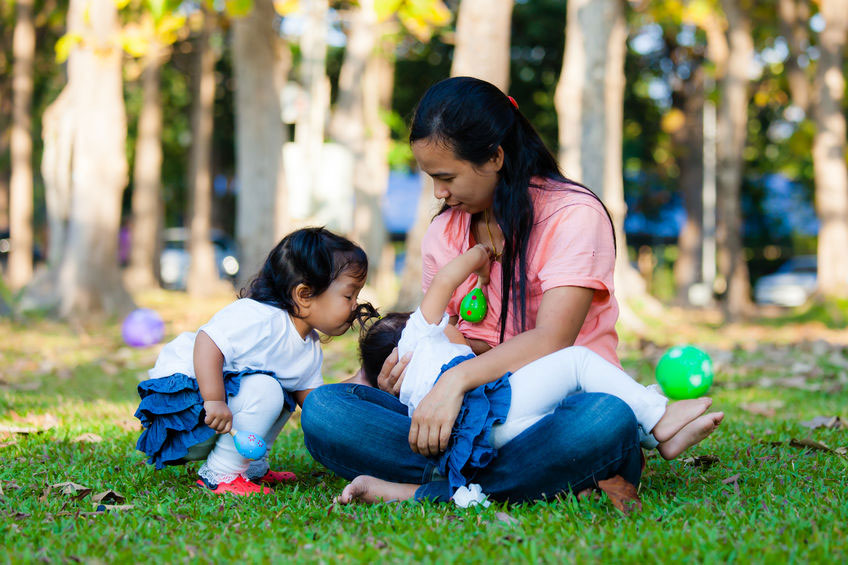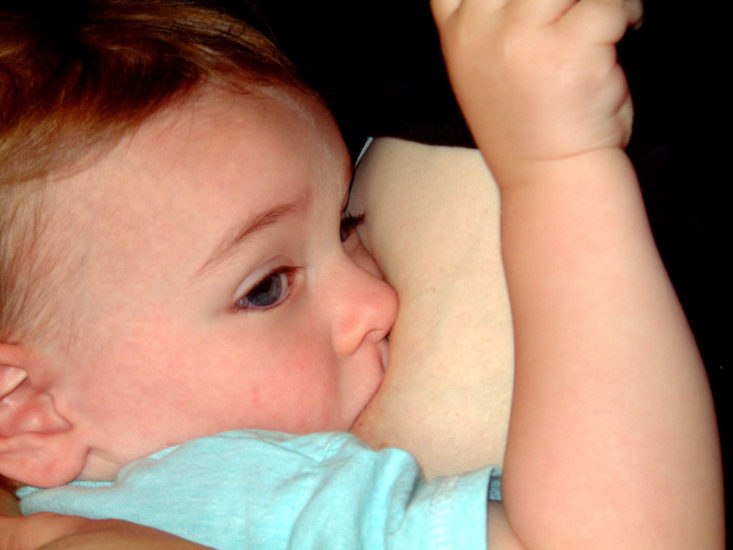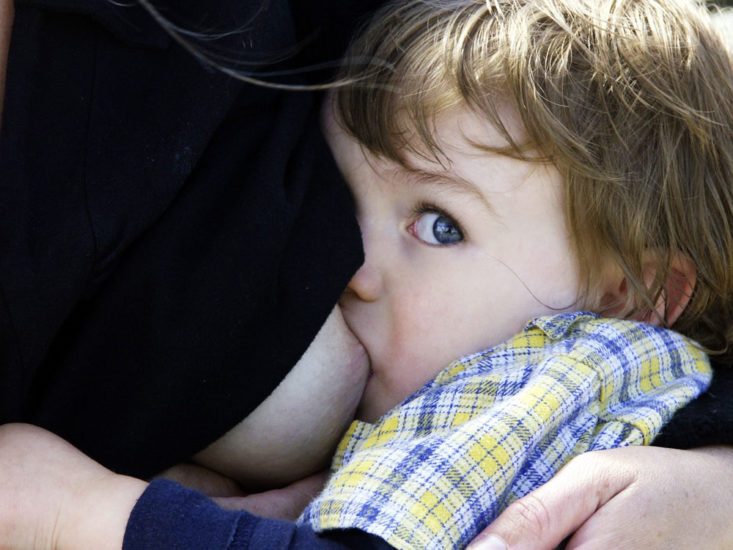You can breastfeed for as long as you and your baby are happy to breastfeed. There is no upper age limit at which breast milk becomes like water (and even if it did, children need water, right?). And there is no need to worry that if you don’t wean by a certain age your little one will never wean, or that there would be any negative psychological effects.
This article
This article looks at the natural age of weaning, the benefits of continuing to breastfeed past society’s expectations and answers frequently asked questions about breastfeeding an older baby.
Are there any official recommendations for how long breastfeeding should last?
Places such as the World Health Organization1 or UNICEF (United Nations Children’s Fund)2 both recommend breastfeeding children for at least two years:
From the age of 6 months, children should begin eating safe and adequate complementary foods while continuing to breastfeed for up to 2 years and beyond.
What is the natural age of weaning for human babies?
Kathy Dettwyler is an anthropology professor, author and breastfeeding advocate who has studied the biologically normal time to stop breastfeeding human babies compared to other mammals. Dettwyler found the minimum predicted age for a natural age of weaning in humans is 2.5 years, with a maximum of 7.0 years.
In societies where children are allowed to nurse “as long as they want” they usually self-wean, with no arguments or emotional trauma, between 3 and 4 years of age.
How does breastfeeding end naturally?
Weaning from the breast usually happens slowly with individual feeds dropped here and there, until one day a nursling wants to breastfeed for the very last time. Perhaps the first feed of the day will be first to go when the hustle and bustle of the morning’s activities are distracting in a busy household. Or perhaps it will be the nap-time breastfeed when a toddler no longer needs a day time sleep. However it happens, gradually more feeds will be forgotten, often so slowly that neither you, nor your baby seem to notice. The last feed to go is frequently the bed-time feed as this is an important time for little ones to reconnect with mum and fall asleep.
Weaning from the breast
Across the world it is normal for babies to continue to breastfeed into their second, third or even fourth year. Although the timing varies widely across children, breastfeeding always ends at some point and you don’t need to be concerned that your adult son or daughter might still ask to breastfeed!
Breastfeeding is much more than food
The speed at which weaning from the breast happens is not solely connected to the availability of alternative food and drink. This is because breastfeeding is much more than a source of food, it plays an important role in meeting a baby’s need for closeness and emotional security and settling to sleep. As babies become more independent, their emotional needs can be met in other ways (cuddles, talking, playing) and they grow out of breastfeeding just as they grow out of babbling or crawling.
Naturally or with a nudge
While many mothers continue to breastfeed until their child stops naturally, others will gently hasten this natural process by offering distractions or setting limits on when or how long to breastfeed.
There is no need to worry that if you don’t wean by a certain age your little one will never weanClick To Tweet
Breastfeeding is healthy for you and your baby
There are many benefits of continuing to breastfeed a toddler for both mother and child:
#1 Great food
Although there may be slight changes in the balance of nutrients over time, breast milk continues to be both a nutritious food and to support the child’s immune system from the first to the last drop.3456
Our findings suggest remarkable consistency in human milk composition over natural-term lactation
#2 Immunity against disease
Human milk continues to support the child’s immune system and provide protection against illness, infection and inflammation.78 The immunological benefits of weaning milk are said to be particularly high.9
The following article originally from Attachment Parenting International explains:
Breastmilk is only 10% nutrition. The remaining 90% continues to contribute to the health and proper development of every system in the child. It continues to provide an essential supply of antibodies for illness protection. The immunological protection from breastfeeding actually increases during the second and third years. Breastmilk is antibacterial, antiviral, anti-parasitic, and antifungal.
#3 Microbiome
The microbiome is the community of microorganisms in our bodies. The right balance of friendly microorganisms supports our long term health and immune systems influencing our genetic and environmental risk of disease. Human milk introduces a favourable gut microbiome compared to infant formula and the full importance of this is still being discovered.10 Although more research is needed, an initial study did not find any significant change in the human milk microbiome between three months and up to four years of nursling age (Shenker et al, 2020)
#4 Emotional security
In addition to continuing to be nutritious, and helping to protect your child from illness, breastfeeding provides comfort and emotional security. Breastfeeding is an amazing help to parenting—quickly fixing all sorts of toddler stresses from tantrums to pain relief to falling asleep thanks to the release of specific hormones. One study found increased behavioural problems and mental health problems in children and adolescents who had a shorter time breastfeeding.11 Far from causing your little one to be clingy or needy, breastfeeding fosters greater security and independence. The Womanly Art of Breastfeeding says:
A common concern is that breastfeeding for two years or longer could make a child more clingy, or dependent. But personality differences aside, research indicates that children who are weaned early tend to be somewhat less secure and independent.
#5 Health benefits for mother
The longer a mother breastfeeds the greater she reduces her risk of breast, ovarian and cervical cancer, osteoporosis, cardiovascular disease, type 2 diabetes and obesity.1213
#6 Correct mouth formation
Continuing to breastfeed into toddler years fosters a wide palate for all your baby’s adult teeth helping to prevent the need for orthodontics for crowded teeth.14
Frequently asked questions
Can you breastfeed a baby once they have teeth?
As the first teeth appear when your baby is around the age of six months, it is quite normal for a baby to still be breastfeeding with teeth. Teeth don’t usually cause any problems. However occasionally an older baby may accidentally bite the breast or graze a nipple with their teeth. See Baby Biting While Breastfeeding for more information about all aspects of biting during breastfeeding and how to prevent it.
What if a child is old enough to ask to breastfeed?
Your baby has been asking to breastfeed since birth. Whether it was by showing feeding cues such as sucking his fingers, searching with his mouth or by crying—even tiny babies can ask to breastfeed. Later a toddler will be able to ask in different ways, perhaps lifting your top or using a special name for breastfeeding. Since some two-year-olds can have a good grasp of language, being able to ask for a breastfeed in words is not a sign that your child needs to wean. However, it may mean that it is easier for you to negotiate shorter feeds, or delay breastfeeding until you get home. This is all part of the process of natural weaning.
Breastfeeding a toddler or pre-schooler is not a newsworthy or shocking event as it is biologically normal.Click To TweetIs the mother doing it for herself?
This question is sometimes asked by people who have never breastfed a child into toddlerhood nor seen natural term breastfeeding close hand. No, the mother isn’t breastfeeding her baby for her own benefit. Breastfeeding an older child can often be uncomfortable and irritating. You cannot make a child breastfeed if they do not want to. Mothers continue to breastfeed because they know their child benefits from it, and because mothering would be harder without the magic of calming a stressed toddler at the breast.
Mother-to-mother support
If you are enjoying breastfeeding but feel isolated because you don’t know anyone else still breastfeeding, it can be very reassuring to find a breastfeeding group for support e.g. a La Leche League meeting.
Three books that offer support and information on breastfeeding through the ages, and weaning, include; Mothering Your Nursing Toddler, How Weaning Happens and The Art of Breastfeeding, LLLI, 2024.
How long should I breastfeed?
This is a personal decision between mother and baby. You can breastfeed for as long as you want to. Equally you can stop when you want to.
The decision when to stop breastfeeding is a personal choice and nobody’s business but a mother’s own. Breastfeeding is not time dependent, you do not have to stop breastfeeding when a baby has teeth or once he can walk or talk, or because family or friends think your baby is too old for “that”.
What if I want to stop breastfeeding?
Have a look at How to Stop Breastfeeding for tips to reduce your milk supply if you want to be more proactive about weaning. Stopping breastfeeding abruptly can be physically and emotionally traumatic for both mother and baby and is best avoided when possible. If you are not sure whether you want to stop breastfeeding but are feeling under pressure to do so, you may find Pressure to Stop Breastfeeding helpful.
Summary
Breastfeeding is much like any other developmental stage, it will be outgrown when the child is ready. This is often when a child is around three or four years old. Some children may be a little older, while some may be a little younger. Some mothers will hasten the process, while some will wait until their little one naturally gives up breastfeeding. Breastfeeding a toddler or pre-schooler is not a newsworthy or shocking event as it is biologically normal. You can breastfeed as long as you want to!
*Excerpt reproduced with permission of Pinter and Martin.

